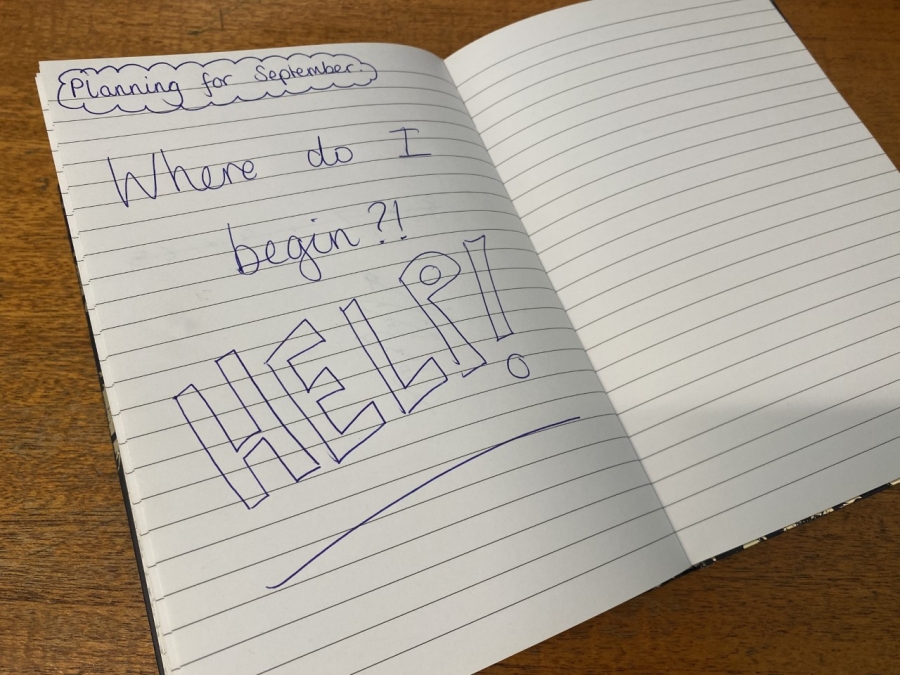Firstly, I think it is important to recognise that this is what we do every day. Teachers spend their days working with children who are weeks, months or years behind all the time. Working with a whole class who are mostly behind might actually make life easier. It might seem daunting right now but it’s really not going to leave a massive footprint for years to come, especially in primary school. We’ve got the time and the freedom to put the pieces back together!
There has been a lot of talk about children’s wellbeing throughout this time. Having spoken to my families every week since school ‘closed’, I know that many of them are not leaving their flats and are finding life particularly challenging. But on the other hand, I know that there are families who have been able to make the most of their time together by getting outside and keeping their brains ticking along with home learning. Because of this gap, we will need to ensure a smooth start to school in September. There’ll be some who say that children would benefit from a soft approach to ease them in. To be honest, I know my pupils will benefit most from structure, routine and rules. I am not saying rock up with a scowl and get shouty on day one but I know that our children feel safest when they know what to expect. Rules, routine and structure will make them feel secure and is a culture conducive to learning. Don’t get me wrong, I’m sure there’ll be a few more chats than normal and they’ll need to be reminded how to socialise and play together but ultimately getting back to normal will make people feel normal.
Without sounding like too much of a Negative Nelly, I will be writing off anything that was set for home learning during the corona pandemic. We cannot tick those boxes as taught objectives. A brief period of informal assessment is all that you need to ascertain where your class is, as well as a good chat with their old teacher. To be clear, I am not saying chuck tests at them left, right and centre. Any good teacher can assess their class by planning effective activities, talking to them and watching them work. To be honest, it’s not dissimilar to normal practice at the start of the year! They just won’t be as far along as normal… and they may have forgotten where the toilets are or what time lunch is.
So where do we go once we’ve assessed our classes? The primary curriculum is a beast and is jam-packed with objectives. There are a few ways we can go about this:
1. Shift the curriculum along by one term
2. Forget about the foundation subjects from the summer term and squeeze in the last year's maths and English objectives
3. Shorten the blocks of history, geography and science to cover what was missed and squeeze in some more maths and English
I have done a lot of thinking and talking about this in the last few weeks and I know that what we do won’t be perfect but it will be best for our pupils and our staff in our situation. While it might make sense to just shift the curriculum along by a term, it will end with everyone being a term behind and our Year 6 teachers may never forgive us! You will need to decide what to prioritise – it can’t be everything. Which gaps are you comfortable letting go? Can they get by without learning about the Stone Age? Do they need to finish that unit on animals including humans?
We will be treating the subjects differently; you cannot have a blanket approach for everything. In maths, our teachers will prioritise numbers. Fortunately, most of this was taught pre-covid but there will be aspects that have been forgotten. We’ll add in extra maths lessons in the afternoons where we need to and we will cover shape, position and direction etc. later on in the year, dipping back into last year’s objectives to scoop up what was missed. I can’t think of a year where I haven’t had to do this anyway! Reading will be easier to tackle, especially further up the school. We can continue to develop their language, decoding and comprehension skills in our daily reading lessons. We’ll have a huge phonics push in KS1 and ensure Year 3 have appropriate interventions taught by their teachers. Our humanities and science units from the summer term will not be taught because there simply isn’t time to do it all well.
It isn’t rocket science, but it does take some thinking and deciding! You know your children so you need to make sure you are doing what is right for them.


















